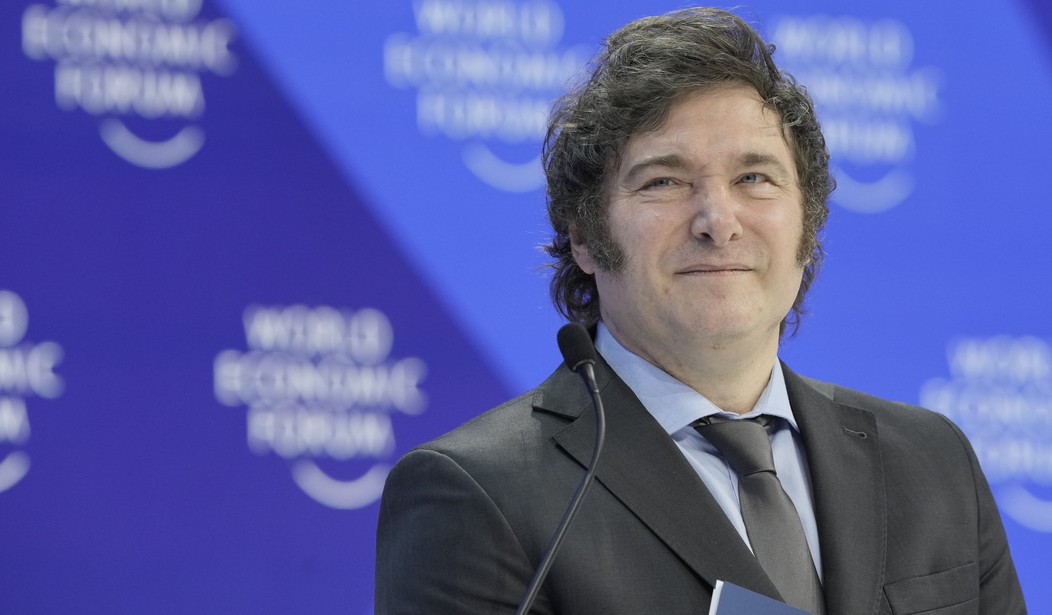How bad do things have to get in America before enough people realize that our bloated government is not the answer? Hopefully, Argentina’s example won’t have to become a reality before Americans wake up.
Argentinian President Javier Milei was elected last year after decades of economic nightmares faced by the populace due to the government’s socialist policies. Argentina’s history serves as a prime illustration of what can happen if socialists are allowed to govern a nation for almost a century.
Milei did not waste any time in enacting his libertarian agenda upon taking office. He has already made a series of reforms intended to support the free market by getting government out of the way.
During an interview with the Wall Street Journal, he touted his administration’s achievements in the short time it has been in office.
Argentina’s new president, Javier Milei, says he is bringing a free-market revolution to the country’s long-troubled economy, cutting thousands of state jobs and slashing regulations on everything from divorce proceedings to the price of milk.
But after less than two months at the helm of Latin America’s third-largest economy, the self-described anarcho-capitalist is already facing off against opponents in the streets and in Congress, where some of his overhauls have already been derailed. Its inflation rate is now the world’s highest, surpassing even Venezuela’s.
In an interview with The Wall Street Journal, Milei said he wouldn’t waver from his campaign promise to shake up the state-controlled economy, despite the acute short-term economic pain it will bring.
“There is no Plan B,” Milei said Tuesday at Casa Rosada, the pink-colored presidential palace in downtown Buenos Aires. “There is no room for feelings, for emotions. I can’t afford that luxury. There are 47 million people waiting for answers.”
Speaking a day before thousands filled the streets and disrupted air travel to protest his overhauls, Milei asserted that the measures are already showing signs of success.
Argentina’s inflation, at 211%, is close to reaching its peak, he said, predicting that “in two years we will have ended inflation, for sure.” The central bank has added $5 billion in the past month to its once-depleted foreign-currency reserves.
Milei also vowed that what he has done so far “represents only a quarter of the reforms we are proposing, and once these laws have passed, we are willing to push for more.”
The Argentinian president’s reforms come amid rampant inflation and other economic woes that have persisted over numerous decades. The nation’s history has been marked by high inflation, economic instability, and socialist government policies, which have led to a significant rate of poverty, unemployment, and other problems.
Argentina was one of the world’s wealthiest countries in the early 20th century. It was buoyed by a strong agricultural sector and overall business-friendly environment. But, by the mid-20th century, the situation took a downward turn.
In the early 20th century, the South American country was one of the world's richest, thanks to its production of beef, wheat and other farm goods, plus an educated workforce made up mostly of European immigrants and their descendants.
But the constant crises, often attributable to government mismanagement and fluctuating commodities prices, have plunged millions into poverty and put the country off-limits to all but the most daring investors today.
In the early 1950s, President Juan Perón made a series of statist moves that devastated the nation’s economy.
However, by the early 1950s, the good times came to an end as commodity prices fell once again. Peron's nationalizations of British-owned railroads and other property antagonized business leaders and caused investment to dry up.
Inflation soared to 40 percent, and real wages plunged. The death in 1952 of Peron's wildly popular first lady, Eva, known as "Evita," weakened him further. Three years later, as labor strikes paralyzed the country, Argentina's military intervened again and sent Peron into exile.
In 1989, inflation rates soared to 5,000 percent, which caused even more unrest and economic disruption. By 2001, the country faced over 20 percent unemployment and defaulted on its debts, which was the largest sovereign default in history at the time.
Today, a significant portion of the population lives in poverty. In 2022, 36.5 percent of the populace was living under the poverty line. In the first half of 2023, the percentage climbed to 40.1 percent.
This brings me back to my original question. Will 40 percent of Americans have to be living in poverty before people finally realize that the state is the culprit for many of the problems we face today? Will there have to be even more social unrest because people are being prevented from achieving economic success?
Inflation in America, while not as bad as other countries, is still out of control. Most of our elected leaders, regardless of party, appear bent on expanding the scope of our already-bloated federal government. Yet, we continue voting in the same people election after election. How bad will it have to get before we elect our own versions of Javier Milei?
Here’s another question: When was the last time politicians, both Democrat and Republican, shrunk the size of the government in any meaningful way?
The answer to that question is a troubling signal for where America is headed if its citizens refuse to wake up.













